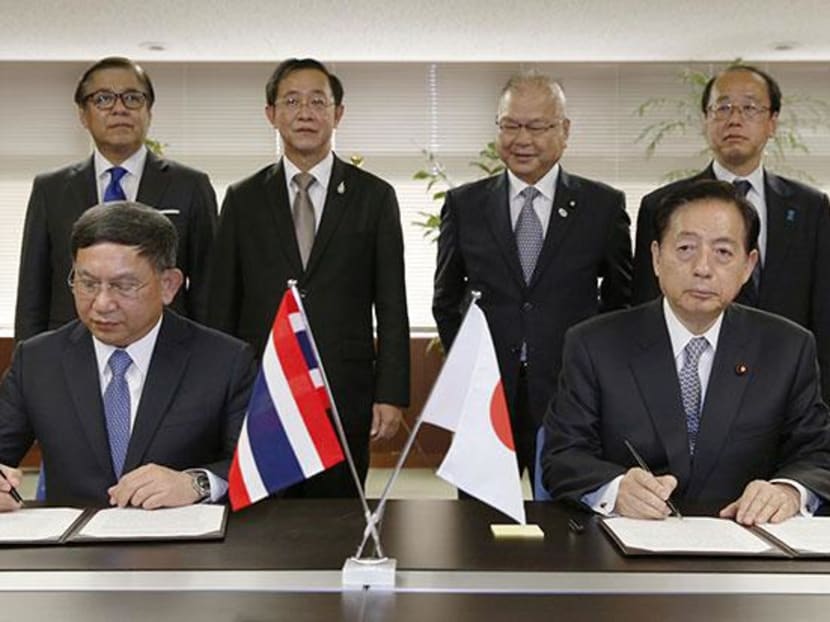Building of shinkansen in Thailand to be explored
TOKYO — Japan and Thailand today (May 27) signed a memorandum of understanding for cooperation with regard to the potential introduction of Tokyo’s shinkansen bullet-train technology in the South-east Asian nation.

Transport Minister Mr Prajin Juntong and his Japanese counterpart Mr Akihiro Ota sign a memorandum of understanding to cooperate on potential introduction of Japan's bullet-train technology in Thailand. Photo: Kyodo News
TOKYO — Japan and Thailand today (May 27) signed a memorandum of understanding for cooperation with regard to the potential introduction of Tokyo’s shinkansen bullet-train technology in the South-east Asian nation.
Signed by Japan’s transport minister Akihiro Ota and his Thai counterpart Prajin Juntong during their talks in Tokyo, the agreement will enable the two countries to begin a feasibility study and evaluate demand and the profitability of a roughly 660km high-speed rail project linking Bangkok and Chiang Mai in northern Thailand, Japanese officials said.
Both sides would also jointly conduct a feasibility study on rail development linking Mae Sot in western Tak province and Mukdahan province in the east, covering 718km.
Japanese rail experts will visit Thailand next month and work with the authorities to carry out surveys of the routes and designs, which will take about six months, said Thai Deputy Transport Minister Arkhom Termpittayapaisith.
Other issues such as financing are expected to be finalised by the year’s end, he said. Construction may begin as early as the second quarter of next year. The Thai Cabinet yesterday approved a US$12 billion (S$16.2 billion) rail project to be built jointly with Japan, said Thai deputy government spokesman Weerachon Sukhonpatipak, one of the plans the government hopes will stimulate the Thai economy.
Chinese firms have also expressed interest in the development.
Yesterday, the Cabinet also approved a draft strategic five-year plan for public-private partnerships worth 1.41 trillion baht (S$56.3 billion), mainly in infrastructure and public transport services. Thai deputy government spokesman Sansern Kaewkamnerd said the plan would be divided into two categories — firms that deserve joint private investment and those in which the government backs the role of private investment.
The first category covers six enterprises including rail mass-transit development and ports, while the second covers 14 enterprises such as inter-city motorways and joint ticketing systems. Mr Sansern said if state agencies want to invest in the first category, they need initial approval from the Public Private Partnership Committee.
Japan has been seeking to increase connectivity in Thailand and Malaysia at a time when the Association of South-east Asian Nations (ASEAN) is trying to establish a more integrated ASEAN Economic Community.
In March, Japan and Thailand agreed to speed up talks on developing the latter’s rail sector. AGENCIES






